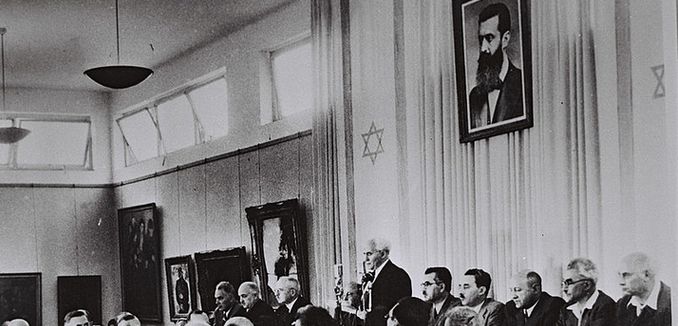Israel’s 66th Independence Day (Yom Ha’atzmaut) was celebrated today. Every year the day before Independence Day, is Yom Hazikaron (Memorial Day) honoring those who fell in battle in defense of the country, as well as the many victims of terror who have died since the Jewish state was founded once again in 1948. In 1948, in fact, the day before David Ben Gurion declared the modern state of Israel, the Jewish forces at Gush Etzion were massacred.
The area of Gush Etzion was settled by Jews three times before 1948. A group of Jews purchased land in the area in 1927 and lived there until forced out by the riots of 1929. A second group rebuilt the area in 1934 and called it Kfar Etzion. That village was destroyed in the Arab of 1936-1939. The third attempt was made in 1943. From 1943 until 1947 the third settlement in Gush Etzion thrived and it was home to 400 people before Israel’s War of Independence.
Israel’s Documented Story – the blog of Israel’s National Archives – tells the story of Gush Etzion’s last stand.
Hagana headquarters in Jerusalem tried to bring supply convoys to the bloc, but this became impossible after the destruction of the “Convoy of the 35” (known by its Hebrew name – the Lamed Hey) in mid-January 1948, and the Nebi Daniel convoy on March 1948, which was attacked on the way back by irregular Arab forces; 14 of its fighters were killed and the rest surrendered their weapons and gear to the British, in exchange for free and safe passage to Jerusalem.
With the intensification of fighting in Jerusalem, the Jerusalem Command pressured the Gush Etzion force to prevent movement of Arab forces on the Hebron-Jerusalem road. Fighters from Gush Etzion attacked traffic on the road, including vehicles of the Arab Legion. The Legion, nominally part of the British army, but in fact an independent force under the orders of King Abdullah of Transjordan, started attacking the bloc with heavy fire. Attacks by an irregular Arab force, under the cover of the Legion, were repulsed on April 12 and on May 4. On May 13, a Legion force, along with hundreds of irregular Arab fighters, attacked and conquered the Etzion bloc in a fierce battle. After their surrender, more than a hundred defenders of Kfar Etzion were murdered by irregular Arab fighters. In other settlements, the Legion intervened and prevented further killing. Wounded prisoners were taken to Jerusalem and prisoners were taken to POW camps in Jordan and released after the Armistice agreement with Jordan in April 1949.
The blog republished a report written by Jacob Altman a commander of the Jewish forces and notes, “Altman fell in battle on May 13, 1948, as the deputy commander of Gush Etzion. His children returned to Gush Etzion after the Six Day War and rebuilt Kfar Etzion, where they, and their descendants, live to this day.”
The next day Ben Gurion declared Israel’s independence. One of the most moving recollections of that day was written by Ambassador Yehuda Avner who told of how he and his fellow diggers heard the news as they prepared the defenses for western Jerusalem.
As the sun went down grimy, exhausted diggers assembled in the glow of a hurricane lamp hanging on the door of a stone ruin, hidden from enemy view, to recite the Sabbath eve prayers – Kabbalat Shabbat. It was a heavenly pause; Shabbat stillness seemed to reign over everything. But then a shell shrieked and blasted the lower reaches of the mountainside, and a headlight briefly cut through the cypress trees at the approaches to Ein Kerem, and we all rolled, crawled, and scrambled for cover. Utter silence followed, broken only by the crunch of rushing feet, panting breath, and the winded cry of Leopold Mahler running out of the blackness into the light of the hurricane lamp by the stone ruin, shouting, “I have news. I have news.”
To a man we scampered back into the flickering glow where Linder grabbed him by the arms and snapped, “Well – talk. What did you find out? Are the Arabs plundering downtown Jerusalem?” Mahler wheezed not. On the contrary, the Jews had taken over the whole area. …
“Has Ben-Gurion declared independence, yes or no?” asked Linder, beside himself with impatience. “David Ben-Gurion declared independence this afternoon in Tel Aviv. The Jewish state comes into being at midnight.”
There was a dead silence. Midnight was minutes away. Even the air seemed to be holding its breath. “Oh, my God, what have we done?” cried one of the women diggers, fitfully rubbing her chin with the tips of her fingers. “What have we done? Oh, my God, what have we done?” and she burst into tears, whether in ecstasy or dismay I will never know.
Then cheers, tears, embraces. Every breast filled with exultation as we pumped hands, cuddled, kissed, in an ovation that went on and on. Nobody wanted it to stop.
[Photo: State of Israel’s National Photo Collection / WikiCommons ]




